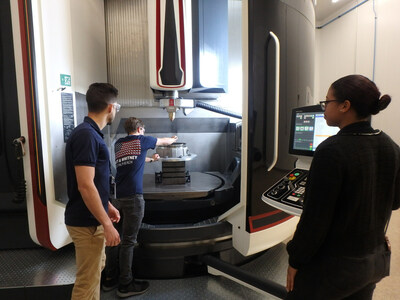RTX's Pratt & Whitney announces North American Technology Accelerator
- None.
- None.
Insights
The establishment of Pratt & Whitney's North American Technology Accelerator (NATA) is a strategic move that can be expected to have significant implications for the company's operational efficiency and cost management. By integrating advanced technologies such as digital inspection and process automation into their MRO services, Pratt & Whitney is poised to enhance their service offerings. This can potentially lead to increased market competitiveness, as the reduction in turnaround times and improvements in throughput are key factors customers consider when selecting MRO service providers.
From a market perspective, the projected recovery of $100 million worth of parts through additive repair technology represents a noteworthy enhancement in asset utilization. This is particularly relevant for shareholders as it suggests a direct impact on the bottom line through cost savings and revenue generation from extended part lifecycles. The anticipated annual savings of $24 million from accelerator programs further underscore the financial benefits of these initiatives.
The environmental implications of the NATA are substantial, as the integration of these technologies aligns with broader industry trends towards sustainability. The use of advanced repairs and coating techniques can reduce material waste, thereby diminishing the environmental footprint of maintenance operations. This is not only beneficial from a corporate social responsibility standpoint but also resonates with environmentally conscious investors and customers.
Moreover, the reduction in material demand and the emphasis on environmental impact mentioned in the announcement highlight Pratt & Whitney's commitment to sustainable practices. Such initiatives may enhance the company's reputation and brand value, potentially influencing consumer preference and investor interest in an era where environmental considerations are increasingly important in business decision-making.
Pratt & Whitney's investment in the NATA and the expected financial outcomes warrant attention from a financial analysis standpoint. The $100 million in part recovery over five years offers a clear indication of the cost-saving potential associated with the NATA's technology insertion programs. For investors, this translates to a tangible return on investment that could be reflected in the company's financial statements in the form of reduced expenses and improved profit margins.
The $24 million in combined annual savings from the accelerator programs also suggests a long-term strategy for cost reduction. This is particularly relevant when considering the capital expenditures involved in establishing such centers of excellence. Investors should monitor how these savings balance against the initial investment and ongoing operational costs to assess the true financial impact on Pratt & Whitney's performance.
Second center of excellence to advance MRO technologies and performance
The accelerator projects in
"NATA combines data science with people know-how and state-of-the-art automation to help address customer pain points such as inventory management and part availability, while accelerating our improved repair capabilities and efficiency to better serve our customers," said Kevin Kirkpatrick, vice president, Aftermarket Global Operations at Pratt & Whitney.
Key projects include additive repairs for critical GTF engine components. With this new additive repair technology alone, Pratt & Whitney expects to recover
NATA complements Pratt & Whitney's fully operational Singapore Technology Accelerator (STA), which was established in September 2022 with a focus on robotics, advanced inspection, connected factory and shop digital twin. STA has since delivered over 30 innovations which will maximize the productivity in MRO processes. Both accelerators leverage other RTX research and development expertise to enhance automation, connectivity, analytics and intelligence to benefit aftermarket operations. Combined annual savings of at least
NATA and STA are part of Pratt & Whitney's Industry 4.0 transformation, enabled by its Customer Oriented Results and Excellence (CORE) operating system which is at the foundation of the business' technology accelerator strategy. CORE provides a common language, toolset, and methodology for delivering on customer commitments. The CORE system assesses and pinpoints critical areas and provides a framework from which to execute.
About Pratt & Whitney
Pratt & Whitney is a world leader in the design, manufacture and service of aircraft engines and auxiliary power units. To learn more, visit www.prattwhitney.com.
About RTX
With more than 185,000 global employees, RTX pushes the limits of technology and science to redefine how we connect and protect our world. Through industry-leading businesses – Collins Aerospace, Pratt & Whitney, and Raytheon – we are advancing aviation, engineering integrated defense systems, and developing next-generation technology solutions and manufacturing to help global customers address their most critical challenges. The company, with 2023 sales of
For questions or to schedule an interview, please contact corporatepr@rtx.com.
![]() View original content to download multimedia:https://www.prnewswire.com/news-releases/rtxs-pratt--whitney-announces-north-american-technology-accelerator-302111733.html
View original content to download multimedia:https://www.prnewswire.com/news-releases/rtxs-pratt--whitney-announces-north-american-technology-accelerator-302111733.html
SOURCE RTX







